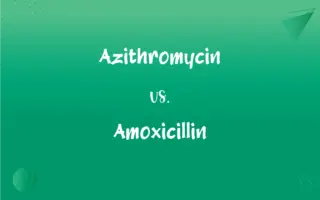Encystment vs. Excystment: What's the Difference?
Edited by Aimie Carlson || By Harlon Moss || Published on February 26, 2024
Encystment is the process of an organism forming a cyst for protection or dormancy, while excystment is the process of emerging from the cyst.

Key Differences
Encystment is a biological process where an organism, typically a protozoan or parasite, forms a protective cyst around itself. This is often a response to harsh environmental conditions. Excystment, in contrast, is the process where the organism emerges from the cyst, usually when conditions become favorable for growth or activity.
During encystment, an organism undergoes physiological changes, secreting a resistant outer layer to protect against desiccation, temperature extremes, or nutrient scarcity. Excystment involves breaking down this layer, often triggered by specific environmental cues, allowing the organism to resume its normal functions.
Encystment serves as a survival strategy, enabling organisms to withstand adverse conditions for extended periods. Excystment allows these organisms to re-enter their active life cycle stages when environmental conditions improve, ensuring their survival and propagation.
The timing of encystment is typically dictated by environmental stresses, while the timing of excystment is usually aligned with the availability of resources or suitable conditions for growth or reproduction.
A common example of encystment and excystment is seen in certain protozoans like amoebae, which form cysts during dry or nutrient-poor conditions (encystment) and re-emerge to feed and multiply when conditions are favorable (excystment).
ADVERTISEMENT
Comparison Chart
Definition
Formation of a protective cyst
Emergence from a cyst
Trigger
Harsh environmental conditions
Favorable environmental conditions
Purpose
Survival during adverse conditions
Resumption of active life cycle
Physiological Changes
Secretion of a resistant outer layer
Breakdown of the cyst layer
Timing
Dictated by environmental stress
Aligned with resource availability or conditions
ADVERTISEMENT
Encystment and Excystment Definitions
Encystment
Encystment is a survival mechanism against harsh conditions.
In response to the nutrient deficiency, the microbe initiated encystment.
Excystment
Transition from a dormant cyst to an active state.
In spring, the excystment process is observed in various microbes.
Encystment
The process of forming a protective cyst around an organism.
The amoeba undergoes encystment to survive the dry season.
Excystment
The act of breaking out of a cyst for active life.
Excystment enabled the organism to resume feeding activities.
Encystment
The formation of a cyst as a defensive response to stress.
The algae exhibited encystment to withstand the toxic environment.
Excystment
Excystment is the reactivation from a dormant cyst state.
The bacteria's excystment was triggered by increased moisture.
Encystment
A dormancy strategy where an organism encases itself in a cyst.
Encystment allows the parasite to endure periods of host absence.
Excystment
Excystment occurs when favorable conditions return.
Nutrient availability initiated the microbe's excystment.
Encystment
Encystment is an adaptation for environmental endurance.
Faced with extreme cold, the organism resorted to encystment.
Excystment
The process of emerging from a protective cyst.
With the arrival of rain, the protozoan began its excystment.
Encystment
To enclose in or as if in a cyst.
Excystment
The process, or the result of excysting
Encystment
To take the form of or become enclosed in a cyst.
Encystment
The formation of a cyst.
Encystment
The process of becoming enclosed by a cyst.
Encystment
A process which, among some of the lower forms of life, precedes reproduction by budding, fission, spore formation, etc.
Encystment
A process by which many internal parasites, esp. in their larval states, become inclosed within a cyst in the muscles, liver, etc. See Trichina.
FAQs
Are encystment and excystment quick processes?
These processes can vary in duration, depending on the organism and environmental factors.
What triggers encystment?
Encystment is triggered by adverse environmental conditions like nutrient scarcity or extreme temperatures.
What happens during excystment?
During excystment, the organism breaks out of the cyst and resumes its normal functions.
Do encystment and excystment involve genetic changes?
These processes mainly involve physiological changes, not genetic alterations.
Can human activities affect encystment and excystment?
Yes, environmental changes due to human activities can impact these processes.
Can encystment happen multiple times in an organism's life?
Yes, an organism can undergo encystment multiple times if necessary.
Is encystment a form of hibernation?
It's similar but specific to microorganisms and involves forming a cyst.
Can all microorganisms undergo encystment?
Not all, but many protozoans and some bacteria and algae can undergo encystment.
Is excystment always successful?
Not always; it depends on the organism's condition and environmental factors.
Are encystment and excystment part of a life cycle?
Yes, they are part of the survival and reproductive cycles of some organisms.
Can encystment occur in any environment?
Encystment generally occurs in environments that pose a threat to the organism's survival.
Is encystment reversible?
Yes, through the process of excystment when conditions improve.
Are encystment and excystment unique to certain species?
These processes are more common in specific groups like protozoans.
Can encystment protect against predators?
Yes, it can provide temporary protection from predation.
Is there a size limit to organisms that can encyst?
Generally, smaller, single-celled organisms are capable of encystment.
How do organisms know when to excyst?
They respond to specific environmental cues signaling favorable conditions.
Do both processes occur in the same environmental conditions?
No, encystment occurs in harsh conditions, while excystment occurs in favorable conditions.
How do environmental changes impact these processes?
Environmental changes can either induce or hinder these processes.
What is the main benefit of encystment?
The main benefit is increased survival during adverse conditions.
Can encystment be studied in a lab?
Yes, it's a common subject in microbiology and environmental studies.
About Author
Written by
Harlon MossHarlon is a seasoned quality moderator and accomplished content writer for Difference Wiki. An alumnus of the prestigious University of California, he earned his degree in Computer Science. Leveraging his academic background, Harlon brings a meticulous and informed perspective to his work, ensuring content accuracy and excellence.
Edited by
Aimie CarlsonAimie Carlson, holding a master's degree in English literature, is a fervent English language enthusiast. She lends her writing talents to Difference Wiki, a prominent website that specializes in comparisons, offering readers insightful analyses that both captivate and inform.






































































